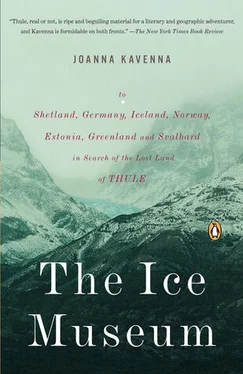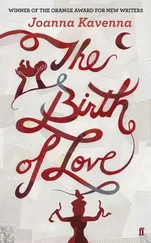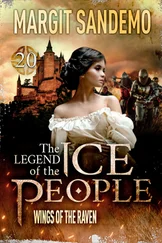Mart and Karin were angled self-consciously against the table, dressed in casual clothes. Karin had long blond hair, her skin had been smoked to leather, and her hands trembled when she grabbed her coffee. On the phone, they had told me they could introduce me to former President Meri, but when I arrived they seemed elusive, slightly nervous, shying away from my questions about him. Instead, Karin said: ‘I am a part-owner of a bar. We model ourselves on Notting Hill. We have bare walls except for photos of heroin chic. It’s what people want to see.’ Mart was outlandish, talking about his yachts and his luxuries; he had been made a millionaire by the last decade, though he wore his wealth nervously. He spoke an arrestingly beautiful English, without any trace of an Estonian accent; it was so notable I kept asking him how he had learnt it, while he talked about ski trips and the stock exchange and all the money he had made.
He said: ‘Why don’t you come with me to a Russian bar? We will drink shots of vodka. I have a boat; we could all go sailing. It’s moored close to here. I have a beautiful country house. Do you like to ski? We can organize the most extraordinary, the most superlative skiing trips, though generally such snowy activities require a significant tolerance of sub-zero temperatures, far worse than your lukewarm European winters.’
‘But your English,’ I said again, ‘how did you learn such good English?’
He laughed and said: ‘It is superfluous these days. Extraneous, you might say. So I may as well enlighten you. I was trained in what we shall call, for lack of a better term, spy school. The Russians plucked me from my local school, and sent me there. We were taught a variation on the ordinary syllabus, with a greater emphasis on language acquisition, colloquialisms, and international knowledge. I have a rather encyclopaedic knowledge of English and American institutions, for example. I know enormous amounts about Ivy League universities and the English “Old Boys’ network.” If you invited me to a black-tie dinner, I would of course know exactly the outfit required. I am losing some of the fineries of my speech. But we were made to blend in,’ he said.
He said he was created to slide into the professional elite in the USA or the UK, made as an establishment figure, designed to meet the right people, to mingle at exclusive gatherings. I didn’t entirely believe him, though later when he caught me looking thoughtful, he said: ‘Don’t be such a Byronic malcontent,’ and the phrase was such an unlikely one that I doubted my own scepticism.
Karin was saying, ‘There is so much happening in Tallinn, it’s a great city. I would like to travel, to go to the USA. I present TV programmes in Estonia. I am still able to do that, though I am no longer young. The young people who didn’t come through the system understand nothing. They are spoilt already. We, the older generation, are the people who really understand how lucky we all are now.’
Karin and Mart were both thirty-something, and had grown up in Soviet Estonia; they had still been students when Communism collapsed. The generation that had prospered during Communism seemed irrelevant to Karin, so her sense of age was foreshortened. In Karin’s gleaming new world order, half the population had been cast out, as the weary dregs of the Soviet system. Thirty was a fine age to become prime minister; fifty was too old, she said.
‘Come to the Russian drinking pit,’ said Mart. ‘I will buy us some vodka and blinis. We have to support our impoverished minority, the Russians, brought to a sorry state now their empire is over. We Estonians pity the individuals of course, but we find it rather appropriate that the Russians should now be marginalized in the town they tried to ruin.’
We crossed the main square, ducking into a bar called Troika, where the waiters were dripping vodka into glasses arranged in rows on the tables. The bar was already filling up for the evening, large tables of people toasting each other and emptying their glasses.
‘Let me tell you about the history of my poor nation,’ said Mart, clinking his glass against mine, while Karin lit a cigarette.
Tallinn was built by invading armies, bellicose knights and rapacious merchants. Crusaders began arriving in the country in the thirteenth century, baptizing the natives, declaring northern Estonia a Danish province. The Teutonic Knights made an early appearance, and then the Hanseatic merchants came, sailing their ships to Tallinn, building mansions. There were peasant revolts, but the German Knights hung on, until greedy neighbours arrived—the Swedes, the Russians. The Swedes pacified the peasantry by selective acts of strategic benevolence; Gustav Adolf founded a university south of Tallinn, in Tartu. For all the superficial altruism, Estonia was governed by an oligarchy of Swedish and German nobles, who used the people as serfs. Estonia became a seat of German barons, bishops and burghers, a Protestant nation. The Baltic barons remained locally powerful, even after Russia sent in armies in the early eighteenth century. Later, after a deal between these Balts and the Russians, the region became the property of the tsar, with the Balts remaining as administrators and owners of vast tracts of land. Tallinn became a place of vicious social divisions: the aristocracy, the bourgeoisie held entirely distinct, making their money from trade, and the Estonian serfs, wearing their ankle-length black coats, with sandals and long fair hair.
After the Russian Revolution of 1917, Estonia was recognized as a free state. The Soviet Union renounced all rights of sovereignty, only to decide twenty years later that the treaty had been far from binding.
‘You can understand,’ said Mart, finishing his drink, pouring himself another, pouring me another, though I tried to refuse, ‘that we are still a little worried about our border with Russia. And you may also comprehend why we have a strange sense of history. We were occupied by both the Nazis and the Communists, our country was entirely obliterated by their wars. They are both equally evil, I think, both equally reprehensible. You should talk to our recent prime minister, he’s a close personal friend of mine, I’ll put you in touch. His wife’s grandfather was killed by the Nazis; his own grandfather was killed by the Communists. It gives you a particular perspective on these dogmas.’ And he started fumbling with his latest-model mobile phone.
‘Awful times,’ said Karin, puffing smoke everywhere. ‘We all know Russian, but no one wants to speak it. We try to forget. Though it is useful sometimes for business.’
‘I can give you a collection of numbers,’ said Mart. ‘I know everyone, everyone you need to know. If you meet someone, ask them if they are acquainted with me. If they’re not, then ignore them.’
Finally Mart gave me a piece of paper. The address he had scrawled out, Meri’s house, was a short distance outside the old town, on a peninsula with a view back to the capital.
‘I’ll arrange you an appointment,’ he said, as they waved me into the night outside the hotel.
The following day I drove beyond the city walls into new Tallinn, where the streets became grey and the Soviet housing blocks loomed above the dirty houses. The trolley buses juddered along rough tracks, jolting the inhabitants into the suburbs, where the buildings degenerated into cramped wooden rows. The streets were lined with architectural horrors, Stalinist attempts at a hybrid style, superfluous columns stranded halfway up the sides of barren blocks, a sense of mournful ugliness to the whole. There were fleets of dusty archaic cars parked in the gutters, and signs to cheap hotels hanging from grey façades. There were sullen buildings housing technical colleges, and schools. Smoke rose from brick chimneys.
Читать дальше












